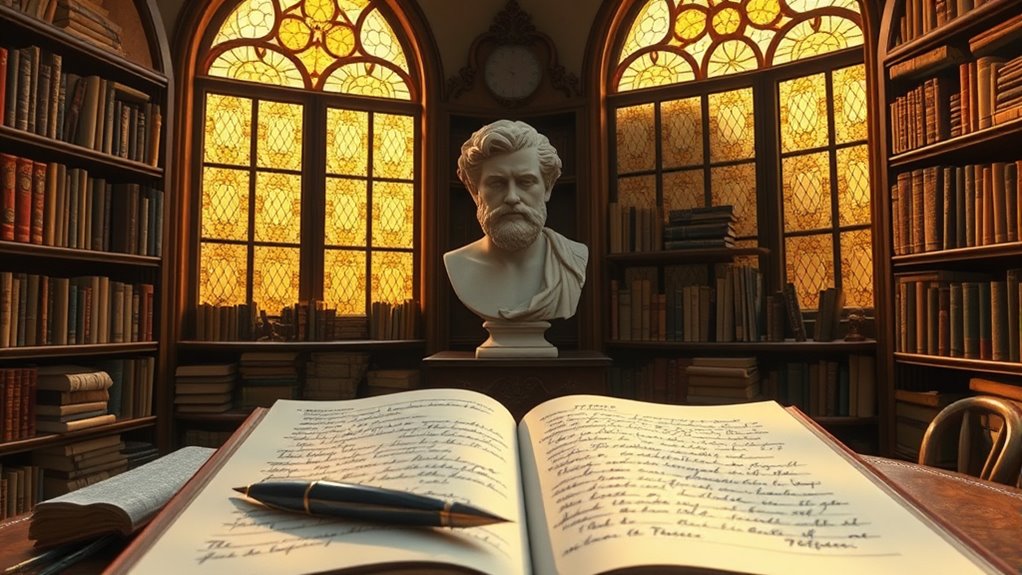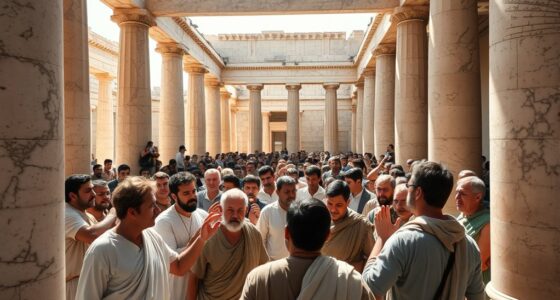Skepticism faded gradually as society shifted toward relying more on empirical evidence and authoritative religious doctrines. However, during the Renaissance, skepticism was revived as a crucial tool for questioning accepted wisdom and exploring new ideas. Thinkers like Copernicus and Galileo used skepticism to challenge outdated views, fostering curiosity and scientific progress. This revival encouraged critical thinking and inquiry, shaping modern science and philosophy. If you’re curious, there’s much more to uncover about how this influential period transformed our approach to knowledge.
Key Takeaways
- Skepticism declined as religious and authoritative doctrines gained prominence, emphasizing faith and doctrine over questioning.
- The Renaissance revived skepticism by encouraging curiosity, empirical observation, and challenging traditional beliefs through dialogue and debate.
- A shift toward evidence-based reasoning and scientific methods tempered radical skepticism with rational inquiry.
- Skepticism became more focused on refining knowledge rather than outright rejection, balancing inquiry with accepted ideas.
- The legacy of Renaissance skepticism influenced modern scientific skepticism and critical thinking, fostering an environment of inquiry.

During the Renaissance, skepticism blossomed as a pivotal intellectual movement that challenged traditional authorities and encouraged critical inquiry. You find yourself at a time when people are questioning long-held beliefs, seeking new ways to understand the world around them. Scientific inquiry becomes a powerful tool, pushing thinkers to observe, experiment, and verify ideas rather than accept dogma blindly. This shift fuels a culture where questioning everything—philosophical and scientific alike—becomes not just accepted but essential. You’re encouraged to doubt accepted truths, to probe beneath surface appearances, and to seek evidence before drawing conclusions. This attitude fuels advances in science, as figures like Copernicus and Galileo challenge the geocentric view, insisting on empirical evidence and direct observation. Their work exemplifies how skepticism drives progress, transforming the way humans approach understanding the universe. Additionally, the development of calibration techniques in scientific instruments helps ensure more accurate and reliable observations, further reinforcing the importance of empirical verification. At the same time, philosophical questioning takes center stage. You’re not just passively accepting doctrines handed down from authorities; instead, you’re urged to ask fundamental questions about existence, morality, and knowledge itself. Thinkers like Descartes emphasize doubt as a method for arriving at certainty—”I think, therefore I am”—highlighting how skepticism can serve as a foundation for building knowledge. This philosophical questioning fosters a sense of intellectual independence, where you’re encouraged to scrutinize assumptions and develop your own reasoned beliefs. The Renaissance becomes a period where curiosity is celebrated, and the boundaries of accepted wisdom are pushed outward. You see scholars engaging in dialogues, debates, and writings that challenge the status quo, fostering an environment where skepticism is not seen as mere doubt but as an essential tool for uncovering truth. However, as the Renaissance progresses, there’s a gradual shift away from unbounded skepticism. The emphasis on empirical evidence and rational inquiry begins to solidify into a new worldview, sometimes leading to skepticism’s decline in certain areas. The rise of dogmatic religious doctrines and authoritative institutions begins to temper the radical questioning that once flourished. Still, the spirit of Renaissance skepticism leaves a lasting legacy, shaping modern scientific methods and philosophical thought. You can trace its influence in today’s scientific skepticism and the ongoing questioning of authority in various fields. The Renaissance’s revival of skepticism was not about rejecting knowledge but about refining the pursuit of it—urging you to think critically, question assumptions, and seek evidence. In doing so, it laid the groundwork for a more inquisitive, open-minded approach to understanding the world.
Frequently Asked Questions
How Did Ancient Philosophies Influence Renaissance Skepticism?
Ancient philosophies heavily influenced renaissance skepticism by reintroducing ideas of inquiry and questioning authority. You see, thinkers studied Greek and Roman texts that emphasized reason, observation, and doubt, which challenged accepted beliefs. This renaissance influence encouraged you to think critically and question dogmas, leading to a shift away from blind faith. As a result, skepticism blossomed, grounded in the rediscovery of ancient philosophies that prioritized individual reasoning and empirical evidence.
What Role Did Religious Changes Play in Shifting Skepticism?
Think of religious reform as the Reformation’s wake-up call, shaking faith’s foundations. Your skepticism grows stronger as doctrinal shifts challenge long-held beliefs, prompting you to question authority and dogma. These changes encourage critical thinking, much like Galileo’s telescope revealing new truths. Religious reform catalyzed this shift, making you more open to questioning, exploring, and ultimately reviving a spirit of inquiry that fuels Renaissance skepticism.
Were There Key Figures Who Challenged Prevailing Beliefs During the Renaissance?
During the Renaissance, key figures challenged prevailing beliefs by promoting empirical inquiry and questioning authority. You see, thinkers like Galileo and Copernicus questioned the church’s teachings, encouraging others to seek evidence and think independently. They emphasized observation and reason, sparking a shift away from unquestioned acceptance. This new approach empowered people like you to challenge traditional ideas, laying the groundwork for modern science and a more skeptical worldview.
How Did Technological Advancements Impact the Spread of Skeptical Ideas?
Imagine vibrant ink flowing through the print revolution, spreading like wildfire across Europe’s towns and cities. Technological advancements in printing and media dissemination made skeptical ideas more accessible, breaking the echo chambers of old beliefs. As newspapers, pamphlets, and books multiplied, people questioned authority and tradition. The rapid spread of these ideas ignited curiosity, empowering individuals to challenge accepted truths and fueling the rebirth of skepticism during the Renaissance.
What Lasting Effects Did Renaissance Skepticism Have on Modern Science?
You see, Renaissance skepticism left a lasting mark on modern science by emphasizing empirical inquiry and questioning traditional beliefs. It encourages you to rely on evidence rather than assumptions, fostering critical thinking. This philosophical skepticism pushes you to seek proof before accepting ideas, shaping scientific methods today. As a result, you value curiosity and verification, ensuring that scientific progress continues grounded in rational doubt and systematic investigation.
Conclusion
As you step back into the vibrant world of the Renaissance, you see skepticism blooming like a cautious, budding flower amid a sea of newfound knowledge. It’s as if the era’s bright lanterns pierce through shadows of doubt, illuminating paths of inquiry and curiosity. Skepticism, once dimmed, now dances lively in the sunlight of discovery, reminding you that questioning fuels progress. In this rebirth, doubt becomes your guiding star, leading you toward endless horizons of understanding.









